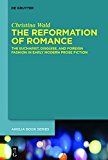
The Reformation of Romance: The Eucharist, Disguise, and Foreign Fashion in Early Modern Prose Fiction (Buchreihe Der Anglia / Anglia Book, Volume 44) PDF
Preview The Reformation of Romance: The Eucharist, Disguise, and Foreign Fashion in Early Modern Prose Fiction (Buchreihe Der Anglia / Anglia Book, Volume 44)
This study takes a fresh look at the abundant scenarios of disguise in early modern prose fiction and suggests reading them in the light of the contemporary religio-political developments. More specifically, it argues that Elizabethan narratives adopt aspects of the heated Eucharist debate during the Reformation, including officially renounced notions like transubstantiation, to negotiate culturally pressing concerns regarding identity change. Drawing on the rich field of research on the adaptation of pre-Reformation concerns in Anglican England, the book traces a cross-fertilisation between the Reformation and the literary mode of romance. The study brings together topics which are currently being strongly debated in early modern studies: the turn to religion, a renewed interest in aesthetics, and a growing engagement with prose fiction. Narratives which are discussed in detail are William Baldwin's Beware the Cat, Robert Greene's Pandosto and Menaphon, Philip Sidney's Old and New Arcadia, and Thomas Lodge's Rosalynd and A Margarite of America, George Gascoigne's Steele Glas, John Lyly's Euphues: An Anatomy of Wit and Euphues and his England, Barnabe Riche's Farewell, Greene's A Quip for an Upstart Courtier, and Thomas Nashe's The Unfortunate Traveller.
